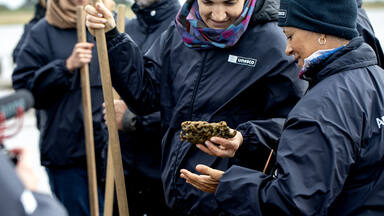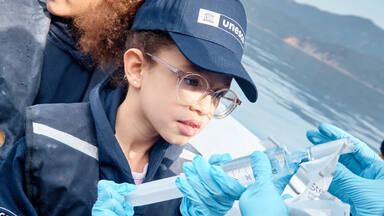Online Meeting: Engaging Citizen Scientists to Safeguard UNESCO World Heritage Marine Sites with Environmental DNA
On Wednesday 30 April 2025, managers from the iSimangaliso Wetland Park (South Africa) and Everglades National Park (United States of America) World Heritage sites, alongside experts from UNESCO, will share first-hand insights from the UNESCO Environmental DNA (eDNA) Expeditions initiative, which showcased the transformative potential of both citizen science and eDNA for monitoring biodiversity in marine protected areas.
UNESCO eDNA Expeditions is the world’s first global use case for detecting ocean biodiversity with citizen-science using shared eDNA collection approaches. Over three years, more than 250 volunteers, some as young as 6 years old, collected eDNA samples at 21 UNESCO World Heritage marine sites spread across 19 countries. This effort empowered local schoolchildren and communities to contribute to marine biodiversity research and understand the impacts of climate change on their local World Heritage marine site.
eDNA is a cost-effective, non-invasive method for biodiversity monitoring, relying on the collection and analysis of genetic material shed by organisms into the water around them. While the analysis of the samples requires complex molecular biology techniques, the collection process is simple enough for non-specialists, making it accessible to global citizens.
The results of the UNESCO eDNA Expeditions, released in a publication in December 2024, revealed the identification of over 4,400 marine species, including 86 shark and ray species, 28 marine mammal species, and 3 turtle species. Among these were 120 species listed as vulnerable, endangered, or critically endangered on the IUCN Red List. Remarkably, the eDNA campaign detected 10 to 20% of the expected local fauna at sampling sites—an accomplishment that would have taken years and cost millions using traditional survey methods.
Several times per year, UNESCO's World Heritage Marine Programme provides an exclusive online platform where managers from the 51 marine World Heritage sites connect and share practical successes in tackling key conservation challenges.
Due to their status as the world’s flagship marine protected areas, UNESCO World Heritage marine sites are uniquely positioned to drive change and innovation, set new global standards in conservation excellence, and serve as beacons of hope in a changing ocean. The online meetings are made possible thanks to the support of the French Biodiversity Agency.
Participation is upon invitation only.




